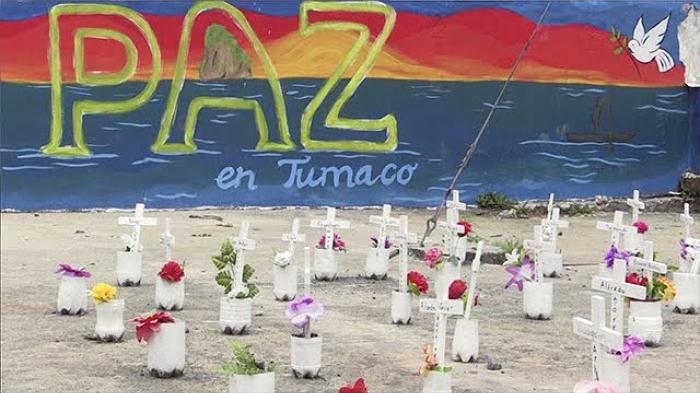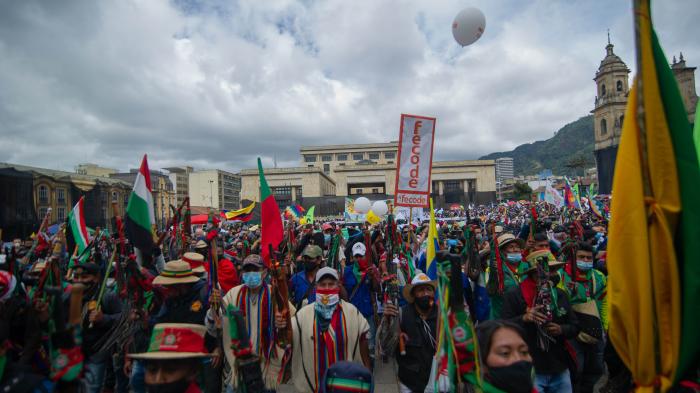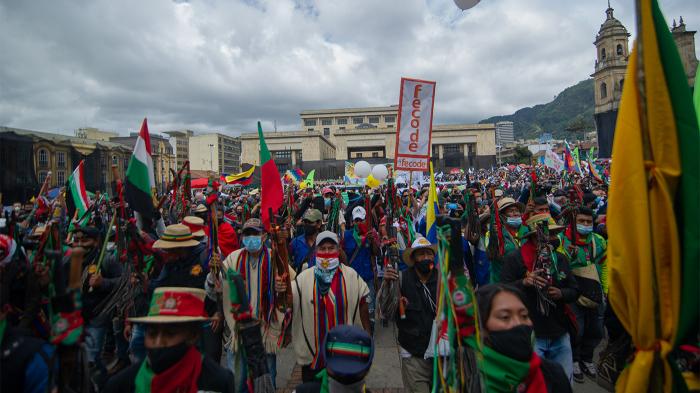Rights Defenders Are Being Killed in Colombia as Government Protection Falls Short
Read a text description of this video
Communal leader:
The simple act of trying to defend fundamental rights, human rights in a community is enough to be declared a “military target.”
VO: In November 2016, the Colombian government and the Revolutionary Armed Forces of Colombia guerrillas or the FARC, reached a landmark peace accord, leading to the armed group’s demobilization. The agreement included specific initiatives to prevent the killing of human rights defenders.
VO: However, the killings have increased as armed groups stepped into the breach left by the FARC.Human rights defenders, including communal, indigenous, peasant and Afro-Colombian leaders, have been killed in remote locations across the country where the presence of state institutions is weak.
Locator: December 2020
Tumaco, Colombia
Afro-Colombian leader:
After the peace agreement, there was a time, a few months of tranquility, of real peace but later these territories were occupied by armed groups that said they were dissidents, or new groups that worked in drug trafficking maintaining routes, crops and laboratories.
Afro-Colombian leader:
Since the government is totally absent, it is up to the communities to solve different problems that arise and to ensure that social, economic, cultural and political rights are recognized and respected and we can enjoy them.
Mireya Oviedo
Women’s Rights Activist
The state [authorities] have recognized us women and men human rights defenders because they have realized that we are where they are not present that we do what they should be doing. But we do it voluntarily out of love and respect for our community because we fully know our territory we understand the needs of the people and face those needs ourselves.
VO: Due to limited state presence in many mostly rural areas, social organizations often play a prominent role in performing tasks typically assigned to local government officials. This increases the visibility of human rights defenders, exposing them to risks.
Afro-Colombian leader:
They sentence to death anyone who reports, who makes public the abuses and violations of human rights, the corruption, the sexual violence against women.
Communal leader:
The illegal armed group that operates in [our] territory wants to take over the territory and its community. That’s how the fight to protect human rights is limited by pressure from these groups.
VO: Colombia has a broad range of policies, mechanisms, and laws designed to prevent abuses against human rights defenders. However, implementation has often been poor.
The National Protection Unit has made important efforts to offer protection. But the unit faces budgetary constraints and most rights defenders killed were not on its radar.
Women’s Rights Activist
They [the government] thin that having a car, having a bodyguard that this is the solution to the conflicts that we have as a civil society and rights defenders and that is not the case.
Afro-Colombian leader
We need the government to implement collective protection programs that would help us liberate the territories from armed actors so that the traditional [Afro-Colombian and Indigenous] authorities can fulfill their role in [helping ensure] access to public services and economic, social and cultural rights which ultimately allow for a decent quality of life.
VO: Efforts to bring those responsible for these crimes to justice have been significant.
Yet serious progress in prosecuting people who ordered these killings, as well as in dismantling the armed groups, is still needed.
Communal leader
They have captured and killed some of the members and some bosses of these illegal armed groups but what we see is that these organizations don’t end, don’t disappear, they never capture the whole organization.
VO: The government of President Duque has announced new plans to protect rights defenders, instead of duly implementing the existing plans. These new mechanisms have had scant impact on the ground.
Communal leader
We see lots of speeches but in practice, we see too little action.
Afro-Colombian leader
We are fed up of so many new plans, new strategies that don’t work that are not designed with the people, that do not involve the people. So many diagnoses [about the problem] we’re over-diagnosed.
VO: Unless the government takes serious and prompt action, many more human rights defenders are likely to be killed in Colombia, leaving hundreds of vulnerable communities undefended.



